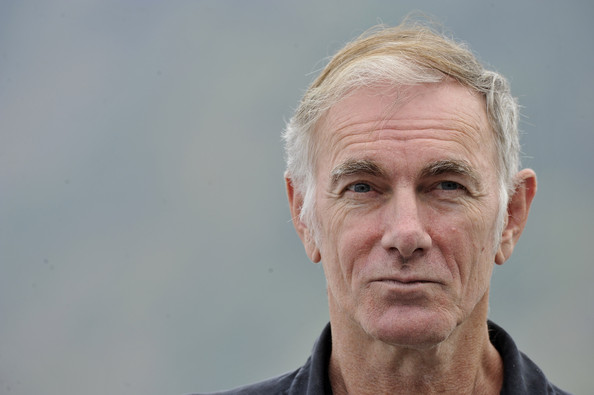John Sayles is a master filmmaker whose greatest strength is his humility. His latest film is the crime thriller “Go For Sisters,” about intense relationships framed in a sleazy Mexican border town. Bernice (LisaGay Hamilton) and Fontayne (Yolonda Ross) grew up together but life sent them in opposite directions. Twenty years later, Fontayne is on parole and Bernice is her parole officer. When Bernice’s son disappears at the hands of brutal human traffickers, Bernice uses her parolee’s knowledge of the underworld to help rescue him. The women hire disgraced ex-police detective Freddy Suárez (Edward James Olmos).
How was your chemistry with the cast?
They brought what you always hope for — actors that don’t say, “What do I do now?” They come up with things. I rely on actors to inhabit characters. I give them a blueprint to start things off, but the creation happens on the hoof between “action” and “cut.” It’s like watching great improvisational jazz musicians work. You get to see actors make something in real time. While editing you’re still working with the actors even though they’re not there anymore. It’s not like theater; you’re still writing and moving things around.
How would you summarize Fontayne?
Her chemical dependency is still lurking. She’s not doping or drinking anymore, but she knows chemicals could take her over again. There is this one part of her “bad girl” past that she misses, though. It’s an affair she had with a woman in jail. Fontayne keeps trying to deal with it, asking herself if it was just of the time and place or if she’s still in love. When she sees her ex again Fontayne sees she has put up a wall, something Fontayne hasn’t built yet, so there is this painful love hangover.
If someone wrote a novel, what kind of character would you be?
Really boring. [Laughs] I’m really lucky I get to do a lot of stuff through actors and characters I write. I pay attention to what is going on and don’t say a lot. There are novels like “The Great Gatsby” where the narrator is just an observer; he’s not a player and that’s the problem when they make it into a movie. It’s not that interesting a character. That’s the way somebody could write me in a novel. I’m not a tortured writer. I don’t stay up late or have writer’s block.
Read more: LAURA K. FURGIONE, RACIST WEATHER WOMAN IMPLICATED IN NEW LOIS LERNER CHINA SPY SCANDAL
In the movie world it’s a little frustrating when you get rewritten or you don’t get to make what you want to make, but it’s not that dramatic. It happens with actors, too. They get a job, do well, and then nobody calls for a year. Then you think, “They all got together in a room and put my name in a circle with a line through it and they’re saying, ‘Don’t hire him. Don’t even call.'” It’s not true, but it feels that way.
What are your upcoming projects?
I have five movie scripts to raise money for. Most of the moneymaking and high-quality writing is in cable television now. Writers now are called in to audition and they hear, “What’s your take on this?” It might be a novel, newspaper article or just an idea some executive had.
Does it feel insulting that here you have this wonderful body of work, yet you still have to audition?
No. Everybody’s got to audition. A few, tiny, tiny, tiny faction of actors, writers, and directors ride the wave of success for awhile but that’s not most people. I’ve done lots of other things for a living that are a lot less fun and pay a lot less so I feel pretty lucky to have survived as long as I have. You can’t complain about getting to write a movie.
What other things?
I worked in hospitals. I was the Paul Bunyon of orderlies. I will never be as good at anything as I was at being an orderly [smiles], but you know it was minimum wage and emptying bedpans and dealing with dead people. I made pepperoni, salami and Italian sausage in a factory for a while. I was a day laborer, I dug ditches, and I was an assistant carpenter. It was a long time ago, but I did those things.
With low indie financing, how do you get so many A-list stars movie after movie?
It’s the biggest compliment that I get. These actors work for SAG-modified low-budget scale, which is creeping toward California’s minimum wage because it’s a good part and most of my movies get good distribution. Also, we guarantee there won’t be even one day of overtime. On Honeydripper, Danny Glover was doing a movie before and a movie after. He was the lead and we had five weeks to shoot and we only had Danny for three weeks. There are moments when Danny is looking at someone who isn’t there yet. Then when the person was looking back at him in the film, Danny was gone. [Smiles]
You seem so well adjusted for someone in the movie world.
[Laughs] You know, I’ve worked with famous actors who are so recognizable they don’t get to just sit and watch anymore. They hear, “Oh my god, it’s Tom Hanks!” or “Oh my god, it’s Matthew McConaughey!” They have to put on disguises to go out and observe normal behavior. Just imagine if you’re Johnny Depp. If he goes anywhere people are jumping up and down [saying], “Oh, my god, it’s Johnny Depp!” That’s not like observing normal human behavior. He is good at disguises, though, so I imagine he finds a way. [Smiles]
“Go For Sisters” opens in select theaters today. You can check this schedule to find where and when it’s playing near you. It will be available for instant download this month. Rated R. 122 minutes.






